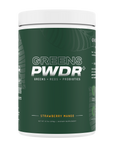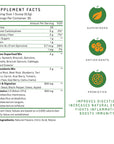

GREENS PWDR+
GREENS PWDR+ is an all natural superfood, antioxidant & probiotic drink mix all in one, formulated to boost natural energy, improve digestion, fight inflammation and strengthen your immune system. Made with no artificial sweeteners, colorings or preservatives, you can ensure you are getting only the good stuff and none of the bad.
You might also like
GREENS PWDR+ is made with ONLY THE GOOD STUFF. Formulated with Superfoods, Antioxidants, Probiotics & Dietary Fibers, GREENS PWDR+ is here to increase your natural energy, improve digestion, fight inflammation and strengthen your immune system.
While most greens on the market are made up of cereal grasses, the problem is humans cannot properly digest them. GREENS PWDR+ contains NO CEREAL GRASSES due to the potential for digestive problems, stomach aches, nausea and inflammation.
GREENS SUPERFOOD MIX
Spinach is abundantly rich in vitamins and minerals, and its phytochemical composition is vast. These compounds have been proven to rid the body of reactive oxygen species (ROS) and turn on the cells’ natural defenses against inflammation and further oxidative damage. Spinach can also promote metabolism with the effect of weight loss through hormonal changes[1].
Kale is a superfood that comes from the brassica group of plants, within the cruciferous vegetables. Kale, more so than other cruciferous plants, is especially rich in calcium, plus several vitamins including vitamin C, folate, riboflavin, and vitamin K[2].
Broccoli is one of the most thoroughly documented beneficial foods for human consumption. Over 3000 publications and 50 clinical trials have supported its health benefits. Many of these benefits are mediated by the compound isothiocyanate sulforaphane. Broccoli has been known for three decades to have anticancer properties[3].
Spirulina is a cyanobacterium long harvested for its health benefits in humans. Spirulina is known to detoxify heavy metals, and also shown hypolipidemic (fat lowering), hypoglycemic (sugar lowering) and antihypertensive properties[5].
Chlorella is a green alga that contains a veritable pharmacopeia of healthful components. The compounds found in Chlorella include omega-3 fatty acids, proteins, vitamins, and minerals. This alga has been a popular source of nutrients, and studies have indicated that they can impart hypolipidemic and hypoglycemic effects, as well as protect against cancer, oxidative stress, and breathing difficulties[28].
Broccoli Sprouts contain the same macronutrients as do adult broccoli florets, however, broccoli sprouts provide many times more glucoraphanin making it beneficial for liver health[36].
Cabbage lies in the Brassica plant family, a group known to possess a large number of beneficial bioactive components. Cabbage in particular has shown promising efficacy as a dietary element that can prevent type 2 diabetes by properly regulating blood sugar levels[41].
Similar to broccoli and cabbage, collard greens are a Brassica vegetable, containing a significant amount of phytochemicals that are associated with many positive health effects in humans, including oxidative stress reduction, immune system promotions, and general detoxification[42].
ANTIOXIDANTS MIX
Maca Root is a Peruvian plant rich in essential amino acids, fatty acids, and other nutrients, including vitamin C, copper, iron, and calcium. Its other bioactive components have been reported to have desirable properties for sexual dysfunction regulation, neuroprotection, along with anti-depressant, antioxidant, anti-inflammatory, and anticancer activities[6].
Beet Root has been shown to have antioxidant, anti-hypertensive, and anti-inflammatory properties. In particular, beets are rich in nitrates, and thus appear to stimulate nitric oxide (NO) production and increase its bioavailability[7].
Blueberries are packed with phytochemicals, particularly the anthocyanin pigments that give the fruit its rich color. Regular consumption of blueberries has been linked to decreased heart disease, decreased risk of diabetes, and neuroprotection. These fruits also have documentable anti-inflammatory and antioxidant activity[23].
Tart cherry is documented to contain many beneficial phytochemicals that together provide an antioxidant effect. It is rich in anthocyanins, and many people report that tart cherry juice is a valuable sleep aid. Scientific studies have shown that one of its components, quercetin, inhibits ROS and can help prevent cellular damage due to environmental stress[24].
Carrots are rich in β-carotene (a precursor to vitamin A), along with other vitamins and minerals. Carrots contain high levels of polyphenols, which give strong antioxidant and free radical scavenging activity[19].
Along with Goji berries and Camu-camu, Açaí berries are “superfruits,” being packed with antioxidants such as polyphenols. These can increase nitric oxide production, relaxing smooth muscle tissue, and protecting against hypertension and kidney disease[8].
Turmeric is a spice in the ginger family. It is rich in curcumin, a polyphenolic compound that has been shown to be an antioxidant as well as being anti-inflammatory and beneficial to the eyes and kidneys. Its bioavailability is enhanced by the simultaneous consumption of black pepper[18].
Rose Hips are famous for their high ascorbic acid (vitamin C) content, but they also contain significant amounts of β-carotene and lutein, compounds that are additionally linked to healthy eyes[20].
Goji Berries (Lycium fruits) are from China and have been traditionally used as a tonic to treat gastrointestinal disorders. Goji berries are rich in vitamins, including riboflavin, thiamine, nicotinic acid as well as several minerals. Moreover, the polysaccharides and carotenoids abundant in Goji berries carry strong protective effects against cellular damage to DNA, lipids, and proteins[8][11].
Camu-Camu is a fruit native to the Amazon rain forest. Its antioxidant properties appear to stem from its ability to lower the cellular concentrations of reactive oxygen species (ROS). Camu-camu is rich in vitamin C and proanthocyanidins, which, as a group, have been shown to have anti-inflammatory, anti-allergic, anti-oxidative, anti-cancer, anti-aging, and immunomodulatory effects[8][12].
FIBER & DIGESTION
Flax seed is rich in omega-3 fatty acids and fiber. In controlled clinical trials, flaxseed consumption was strongly correlated to lowered blood pressure. Other studies have linked flaxseed with improvements in digestion, either through the enhancement of healthful bacterial gut flora, through constipation relief, and/or through maintaining proper cholesterol levels (HDL vs. LDL)[25].
Beyond its very common use as a spice, black pepper can have antimicrobial activity. It can also serve as a digestion aid, plus being an antioxidant, a ROS scavenger, and a protectant against heavy metal toxins[22].
Date palms are rich in polyphenols, micronutrients and dietary fibers. There is also evidence that the consumption of dates could promote heart and gut health[40].
Studies have shown that apples engender a synergistic interaction between apple polyphenols and the soluble fiber pectin, meaning that they have both positive effects on digestion and nutrient value. Apple pectin can also promote a healthy gut biota[26].
PROBIOTICS
Lactobacillus rhamnosus is the oldest recognized probiotic strain, for which research on the benefits to human health date back nearly 35 years. L. rhamnosus is known to thrive in the low pH of the stomach, and as a result, has been linked to helping with many facets of digestion by competing with and combating other strains of bacteria that can be harmful to humans[21][33]
Lactobacillus acidophilus, a probiotic bacterial species has a long history of use in dairy products and in nutritional supplementation. Along with L. rhamnosus, L. acidophilus has been shown to relieve symptoms of gastrointestinal distress, including irritable bowel syndrome when consumed regularly. It may help stave off type 2 diabetes in some individuals[33].
Bifidobacterium longum is another common strain found in the intestinal flora of breast-fed infants. It has been shown to be an anti-inflammatory, and may promote positive cognitive function and mood, especially among athletes[35].
Bifidobacterium bifidum is a probiotic strain that has a long history of use as a nutritional aid via supplementation. It is a natural component of the intestinal flora of breast-fed infants. In scientific studies, it has been linked with anti-cancer and positive immunomodulatory effects[34].


